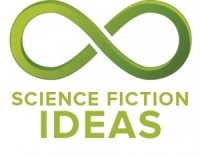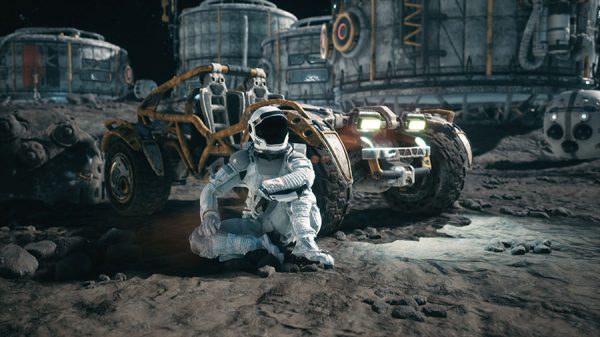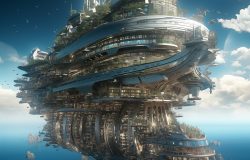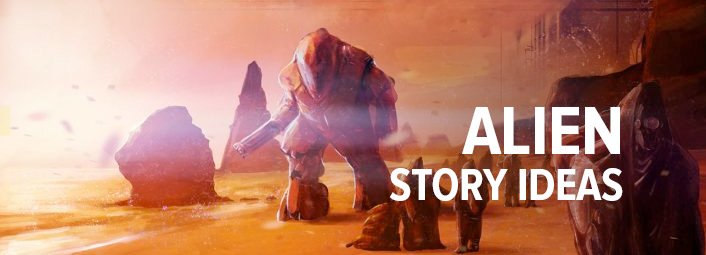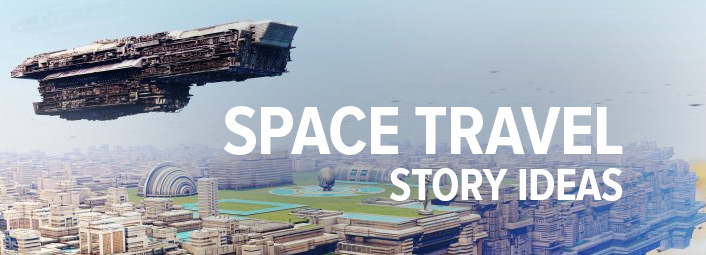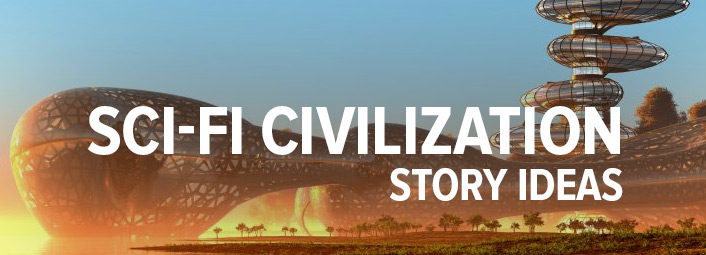50 Science Fiction Themes
I know this is a simple way to start. But my thought behind this website was to give writers a place to go and stir their science fiction related thoughts. And sometimes simple is where great ideas come from. So I figured I’d go ahead and brainstorm some common science fiction themes.
- Space: Space is a common theme in science fiction, and it often involves stories set in outer space or on other planets. Science fiction stories about space may explore themes of exploration, colonization, and the search for extraterrestrial life.
- Time Travel: Time travel is another common theme in science fiction, and it often involves stories about characters who are able to travel through time and witness or alter events in the past or future. Time travel stories may explore themes of alternate histories, paradoxes, and the consequences of changing the past.
- Cyberworlds: Cyberworlds are virtual realities that are created and accessed through computers or other electronic devices. Science fiction stories about cyberworlds may explore themes of artificial intelligence, virtual reality, and the intersection of the physical and digital worlds.
- Aliens: Aliens are another common theme in science fiction, and they often involve stories about extraterrestrial life forms or civilizations. Science fiction stories about aliens may explore themes of first contact, interspecies relations, and the search for extraterrestrial intelligence.
- Robots: Robots are artificial beings that are often used in science fiction as a metaphor for human-like intelligence and consciousness. Science fiction stories about robots may explore themes of artificial intelligence, the ethics of creating and using robots, and the relationship between humans and robots.
- Viruses: Viruses are microorganisms that can cause illness or disease, and they are often used as a plot device in science fiction stories. Science fiction stories about viruses may explore themes of pandemics, genetic engineering, and the dangers of unchecked scientific progress.
- Dinosaurs: Dinosaurs are extinct reptiles that are often used as a plot device in science fiction stories. Science fiction stories about dinosaurs may explore themes of paleontology, genetics, and the consequences of bringing extinct species back to life.
- Ocean Exploration: Ocean exploration is the study of the world’s oceans, and it is a common theme in science fiction stories. Science fiction stories about ocean exploration may explore themes of marine biology, underwater habitats, and the search for new forms of life.
- Artificial Intelligence: Artificial intelligence is the development of computer systems that are able to perform tasks that normally require human intelligence, such as learning and problem-solving. Science fiction stories about artificial intelligence may explore themes of artificial life, machine learning, and the ethics of creating intelligent machines.
- Biodomes: Biodomes are typically designed to be self-sustaining and self-contained, with their own climate control, water filtration, and waste management systems. They may also use advanced technologies, such as hydroponics or artificial lighting, to recreate specific environmental conditions.
- Cyborgs: Cyborgs are beings that are a combination of organic and artificial parts, and they are often used as a metaphor for the intersection of technology and humanity. Science fiction stories about cyborgs may explore themes of human enhancement, transhumanism, and the relationship between the organic and the artificial.
- Clones: Clones are genetically identical copies of living organisms, and they are often used as a plot device in science fiction stories. Science fiction stories about clones may explore themes of genetic engineering, identity, and the ethics of creating clones.
- Invisibility: Invisibility is the ability to become unseen or transparent, and it is a common theme in science fiction stories. Science fiction stories about invisibility may explore themes of stealth, espionage, and the consequences of being able to disappear.
- Teleportation: Teleportation is the ability to transport matter or energy from one location to another, and it is a common theme in science fiction stories. Science fiction stories about teleportation may explore themes of quantum physics, faster-than-light travel, and the consequences of being able to instantly move between locations.
- Origins of life: The origins of life is a scientific question that is often explored in science fiction stories. Science fiction stories about the origins of life may explore themes of evolution, extraterrestrial life, and the search for the earliest forms of life on Earth.
- Dystopian: Dystopian stories are set in a society that is characterized by misery, oppression, and/or suffering, and they often serve as a warning about the dangers of certain social or technological trends. Science fiction stories about dystopian societies may explore themes of totalitarianism, environmental collapse, and the consequences of unchecked progress.
- The Singularity: The singularity is a hypothetical event that is believed by some to mark the point at which artificial intelligence will surpass human intelligence, leading to rapid technological progress and potentially profound changes to society. Science fiction stories about the singularity may explore themes of artificial intelligence, transhumanism, and the consequences of achieving technological singularity.
- Moon bases: Moon bases are permanent settlements on the moon, and they are often used as a plot device in science fiction stories. Science fiction stories about moon bases may explore themes of space exploration, colonization, and the challenges of living and working on the moon.
- Space Battle: Space battles are conflicts that take place in outer space, and they are often used as a plot device in science fiction stories. Science fiction stories about space battles may explore themes of military strategy, intergalactic politics, and the consequences of war in space.
- Mutants: Mutants are beings that have undergone genetic changes or mutations, and they are often used as a plot device in science fiction stories. Science fiction stories about mutants may explore themes of genetic engineering, evolution, and the consequences of tampering with the human genome.
- Mind Control: Mind control is the ability to manipulate or control the thoughts and actions of others, and it is a common theme in science fiction stories. Science fiction stories about mind control may explore themes of psychology and manipulation.
- Shape Shifter: Shape shifters are beings that are able to transform their physical appearance or form, and they are often used as a plot device in science fiction stories. Science fiction stories about shape shifters may explore themes of transformation, identity, and the consequences of being able to change one’s appearance.
- The Apocalypse: The apocalypse is a hypothetical event that marks the end of the world or the end of civilization as we know it, and it is a common theme in science fiction stories. Science fiction stories about the apocalypse may explore themes of disaster, survival, and the consequences of global catastrophic events.
- Space Stations: Space stations are artificial structures that are used for living or working in outer space, and they are often used as a plot device in science fiction stories. Science fiction stories about space stations may explore themes of space exploration, colonization, and the challenges of living and working in space.
- Underground civilizations: Underground civilizations are societies that live beneath the surface of the earth, and they are often used as a plot device in science fiction stories. Science fiction stories about underground civilizations may explore themes of isolation, survival, and the challenges of living underground.
- Terraforming: Terraforming is the hypothetical process of making other planets or moons habitable for human habitation, and it is a common theme in science fiction stories. Science fiction stories about terraforming may explore themes of space exploration, colonization, and the challenges of adapting to new environments.
- Wormholes: Wormholes are hypothetical shortcuts through space and time, and they are often used as a plot device in science fiction stories. Science fiction stories about wormholes may explore themes of faster-than-light travel, time travel, and the consequences of using wormholes as a means of transportation.
- Interstellar travel: Interstellar travel is the hypothetical travel between star systems, and it is a common theme in science fiction stories. Science fiction stories about interstellar travel may explore themes of space exploration, colonization, and the challenges of long-term space travel.
- Sister Earths: Sister Earths are hypothetical parallel or alternate versions of Earth, and they are often used as a plot device in science fiction stories. Science fiction stories about Sister Earths may explore themes of alternate histories, parallel universes, and the consequences of interacting with alternate versions of Earth.
- Alternate Dimensions: Alternate dimensions are hypothetical parallel universes or dimensions that exist alongside our own, and they are often used as a plot device in science fiction stories. Science fiction stories about alternate dimensions may explore themes of parallel universes, quantum physics, and the consequences of interacting with alternate dimensions.
- Superweapons: Superweapons are hypothetical weapons that have the power to destroy or conquer entire civilizations, and they are often used as a plot device in science fiction stories.
- Lasers: Lasers are intense beams of light that are often used as weapons or tools in science fiction stories. Science fiction stories about lasers may explore themes of military technology, space exploration, and the consequences of using lasers as a means of destruction or communication.
- Brain downloads: Brain downloads are the hypothetical transfer of a person’s consciousness or memories into a digital format, and they are often used as a plot device in science fiction stories. Science fiction stories about brain downloads may explore themes of artificial intelligence, virtual reality, and the ethics of transferring consciousness into a digital format.
- Genetically modified humans: Genetically modified humans are beings that have undergone genetic modification or engineering, and they are often used as a plot device in science fiction stories. Science fiction stories about genetically modified humans may explore themes of genetic engineering, evolution, and the consequences of tampering with the human genome.
- Technologically modified humans: Technologically modified humans are beings that have undergone technological enhancements or modifications, and they are often used as a plot device in science fiction stories. Science fiction stories about technologically modified humans may explore themes of human enhancement, transhumanism, and the consequences of merging technology and humanity.
- Lost Astronauts: Lost astronauts are space travelers who have become stranded or lost in space, and they are often used as a plot device in science fiction stories. Science fiction stories about lost astronauts may explore themes of space exploration, survival, and the challenges of being isolated in the vastness of space.
- Frozen planet: Frozen planets are hypothetical planets that are completely covered in ice or snow, and they are often used as a plot device in science fiction stories. Science fiction stories about frozen planets may explore themes of environmental collapse, survival, and the challenges of living on a frigid world.
- Microchip implants: Microchip implants are small chips that are implanted in the body and used for a variety of purposes, including identification, medical treatment, and enhancement. Science fiction stories about microchip implants may explore themes of human enhancement, transhumanism, and the ethics of implanting technology in the body.
- Artificial limbs: Artificial limbs are prosthetic devices that are used to replace lost or damaged limbs, and they are often used as a plot device in science fiction stories. Science fiction stories about artificial limbs may explore themes of human enhancement, transhumanism, and the ethics of replacing body parts with technology.
- Android human replicants: Android human replicants are artificial beings that are designed to look and behave like humans, and they are often used as a plot device in science fiction stories. Science fiction stories about android human replicants may explore themes of artificial intelligence, transhumanism, and the ethics of creating artificial beings that are indistinguishable from humans.
- Nanotechnology: Nanotechnology is the study of manipulating matter on a molecular and atomic scale, and it is a common theme in science fiction stories. Science fiction stories about nanotechnology may explore themes of miniaturization, molecular engineering, and the consequences of manipulating matter at the atomic level.
- Uploaded Consciousness: Uploaded consciousness is the hypothetical transfer of a person’s consciousness or mind into a digital format, and it is a common theme in science fiction stories. Science fiction stories about uploaded consciousness may explore themes of artificial intelligence, virtual reality, and the ethics of transferring consciousness into a digital format.
- Cyborgs: Cyborgs are beings that are a combination of organic and artificial parts, and they are often used as a metaphor for the intersection of technology and humanity. Science fiction stories about cyborgs may explore themes of human enhancement, transhumanism, and the relationship between the organic and the artificial.
- UFOs: UFOs are unidentified flying objects that are often associated with extraterrestrial life, and they are a common theme in science fiction stories. Science fiction stories about UFOs may explore themes of extraterrestrial life, first contact, and the search for intelligent life beyond Earth.
- Alien Abduction: Alien abduction is the hypothetical kidnapping or capture of humans by extraterrestrial beings, and it is a common theme in science fiction stories. Science fiction stories about alien abduction may explore themes of extraterrestrial life, first contact, and the consequences of being abducted by aliens.
- Human Shrinking: Human shrinking is the hypothetical reduction of a person’s size, and it is a common theme in science fiction stories. Science fiction stories about human shrinking may explore themes of miniaturization, physics, and the consequences of being significantly smaller than normal.
- Mad Scientist: Mad scientists are fictional scientists who are portrayed as being obsessed with their research and willing to go to extreme lengths to achieve their goals, and they are often used as a plot device in science fiction stories. Science fiction stories about mad scientists may explore themes of scientific ethics, consequences of unchecked scientific progress, and the dangers of obsession.
- Hive Minds: Hive minds are hypothetical societies or civilizations that are characterized by the collective consciousness of their members, and they are often used as a plot device in science fiction stories. Science fiction stories about hive minds may explore themes of group consciousness, communication, and the consequences of merging individual consciousness into a collective whole.
- Space Race: The space race is a competition between nations or organizations to achieve superiority in space exploration and development, and it is a common theme in science fiction stories. Science fiction stories about the space race may explore themes of competition, nationalism, and the consequences of striving for dominance in space.
Let us know what you think about our ideas! Comment below to give us your opinion, add onto an existing idea, or submit one of your own!
